Intro
Learn about Ectopic Pregnancy Definition, causes, symptoms, and treatment. Understand abnormal implantation, tubal pregnancy, and related complications like miscarriage and infertility, to grasp this life-threatening condition.
An ectopic pregnancy is a serious and potentially life-threatening medical condition that occurs when a fertilized egg implants outside the uterus, typically in the fallopian tube. This can lead to severe complications, including internal bleeding, organ damage, and even death. Understanding the definition, causes, symptoms, and treatment options for ectopic pregnancy is essential for women's health and well-being. In this article, we will delve into the world of ectopic pregnancy, exploring its importance, risks, and management strategies.
Ectopic pregnancy is a significant concern for women of reproductive age, as it can happen to anyone, regardless of their medical history or lifestyle. The condition affects approximately 1 in 50 pregnancies in the United States, resulting in thousands of cases each year. Despite its relatively low incidence, ectopic pregnancy is a leading cause of maternal mortality, emphasizing the need for prompt diagnosis and treatment.
The importance of ectopic pregnancy cannot be overstated, as it has a profound impact on women's health, fertility, and quality of life. Women who experience an ectopic pregnancy may face significant emotional and psychological challenges, including grief, anxiety, and depression. Furthermore, the condition can lead to long-term reproductive health consequences, such as infertility, chronic pain, and increased risk of future ectopic pregnancies. Therefore, it is essential to educate women about the risks, symptoms, and treatment options available for ectopic pregnancy, empowering them to make informed decisions about their reproductive health.
Ectopic Pregnancy Causes and Risk Factors
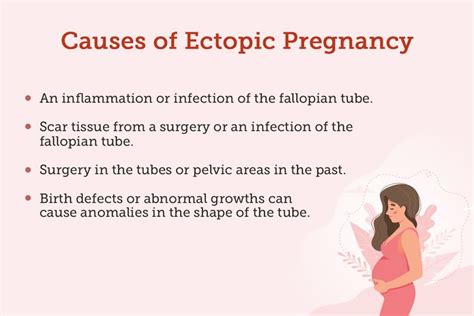
Understanding the Risk Factors
The risk factors for ectopic pregnancy can be categorized into two main groups: medical and lifestyle-related. Medical risk factors include: * Previous ectopic pregnancy * Pelvic inflammatory disease (PID) * Endometriosis * Tubal ligation or other pelvic surgeries * History of infertility or assisted reproductive technology (ART) procedures * Congenital abnormalities of the fallopian tubes or uterusLifestyle-related risk factors include:
- Smoking
- Age over 35 years
- History of intrauterine device (IUD) use
- Previous abdominal or pelvic surgery
Ectopic Pregnancy Symptoms and Diagnosis
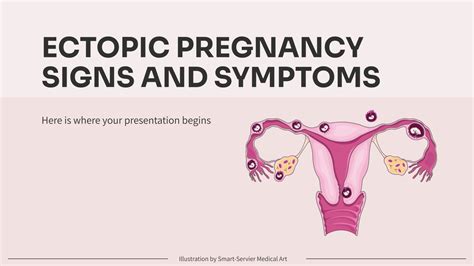
Diagnosing ectopic pregnancy typically involves a combination of physical examination, medical history, and diagnostic tests, such as:
- Pelvic exam
- Ultrasound imaging (transvaginal or abdominal)
- Blood tests (hCG and progesterone levels)
- Laparoscopy or laparotomy (surgical procedures to visualize the fallopian tubes and surrounding tissues)
Importance of Early Diagnosis
Early diagnosis is critical in managing ectopic pregnancy, as prompt treatment can help prevent severe complications and improve outcomes. Women who experience any symptoms or have a history of ectopic pregnancy should seek medical attention immediately.Treatment Options for Ectopic Pregnancy
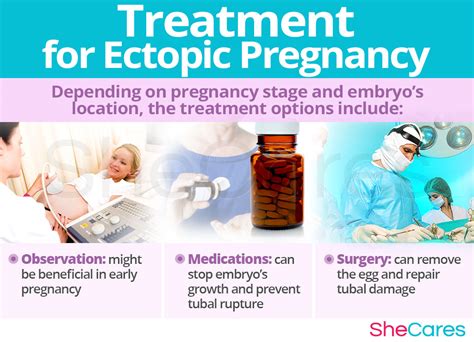
In some cases, women may require emergency surgery to repair damaged fallopian tubes or control bleeding.
Medical Management
Medical management involves using medications, such as methotrexate, to stop the growth of the ectopic pregnancy. This treatment option is typically used for women with a small, unruptured ectopic pregnancy and no significant bleeding.Prevention and Management Strategies
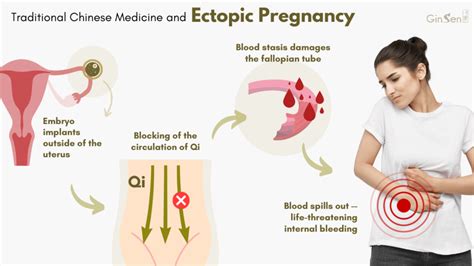
Women who have experienced an ectopic pregnancy should discuss their risks and management options with their healthcare provider to reduce the likelihood of future occurrences.
Lifestyle Modifications
Lifestyle modifications, such as quitting smoking and maintaining a healthy weight, can help reduce the risk of ectopic pregnancy. Women should also prioritize their reproductive health by seeking regular check-ups and discussing any concerns or symptoms with their healthcare provider.Emotional and Psychological Support
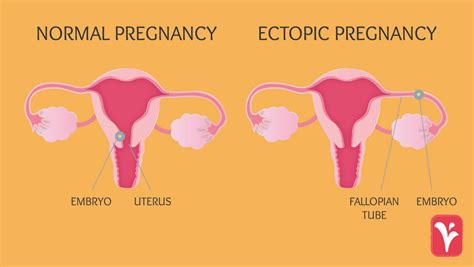
Importance of Support Networks
Support networks, including family, friends, and healthcare providers, play a vital role in helping women cope with the emotional and psychological challenges of ectopic pregnancy. Women should not hesitate to reach out for support and guidance during this difficult time.Future Directions and Research
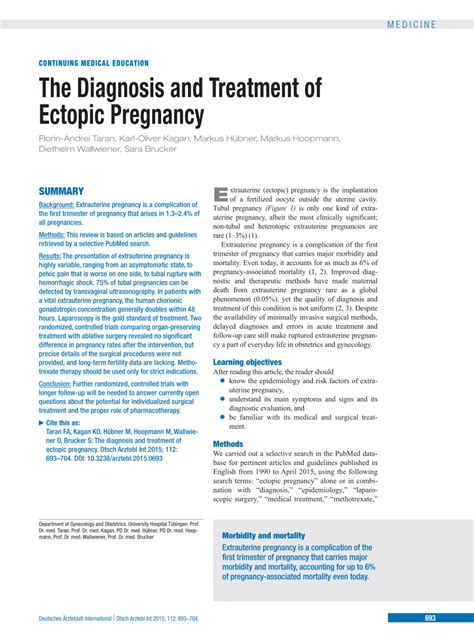
As our understanding of ectopic pregnancy evolves, it is essential to stay informed about the latest developments and advancements in the field.
Emerging Trends and Technologies
Emerging trends and technologies, such as artificial intelligence and machine learning, may play a significant role in improving the diagnosis and management of ectopic pregnancy. Women should stay informed about these developments and discuss their potential benefits and limitations with their healthcare provider.What is the main cause of ectopic pregnancy?
+The main cause of ectopic pregnancy is damaged or blocked fallopian tubes, which can be due to various factors such as pelvic inflammatory disease, endometriosis, or previous surgeries.
What are the symptoms of ectopic pregnancy?
+The symptoms of ectopic pregnancy can vary, but common signs include abdominal pain, vaginal bleeding, and missed periods. Women may also experience shoulder pain, dizziness, or fainting due to internal bleeding.
How is ectopic pregnancy diagnosed?
+Ectopic pregnancy is typically diagnosed using a combination of physical examination, medical history, and diagnostic tests, such as ultrasound imaging, blood tests, and laparoscopy or laparotomy.
What are the treatment options for ectopic pregnancy?
+The treatment options for ectopic pregnancy depend on the severity of the condition and the woman's overall health. Common treatment options include expectant management, medical management, and surgical management.
Can ectopic pregnancy be prevented?
+While it is not possible to completely prevent ectopic pregnancy, women can take steps to reduce their risk, such as practicing safe sex, avoiding smoking, and maintaining a healthy weight and lifestyle.
In conclusion, ectopic pregnancy is a complex and potentially life-threatening condition that requires prompt diagnosis and treatment. By understanding the causes, symptoms, and treatment options, women can take steps to reduce their risk and manage their condition effectively. It is essential to prioritize reproductive health, seek medical attention for any concerns or symptoms, and stay informed about the latest developments and advancements in the field. We encourage readers to share their experiences, ask questions, and seek support from healthcare providers and support networks to raise awareness and promote education about ectopic pregnancy.
